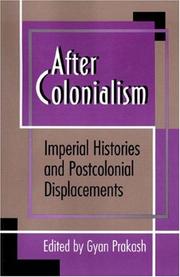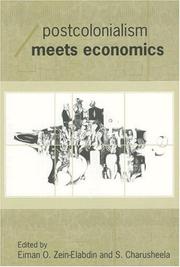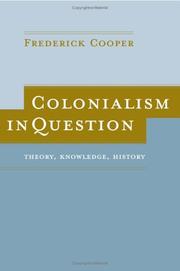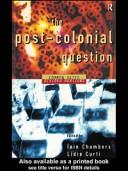| Listing 1 - 10 of 12 | << page >> |
Sort by
|

ISBN: 0691037426 0691037434 1400821444 1282752030 9786612752032 1400813042 9781400821440 9781282752030 9781400813049 Year: 1995 Volume: *4 Publisher: Princeton, N.J. : Princeton University Press,
Abstract | Keywords | Export | Availability | Bookmark
 Loading...
Loading...Choose an application
- Reference Manager
- EndNote
- RefWorks (Direct export to RefWorks)
After Colonialism offers a fresh look at the history of colonialism and the changes in knowledge, disciplines, and identities produced by the imperial experience. Ranging across disciplines--from history to anthropology to literary studies--and across regions--from India to Palestine to Latin America to Europe--the essays in this volume reexamine colonialism and its aftermath. Leading literary scholars, historians, and anthropologists engage with recent theories and perspectives in their specific studies, showing the centrality of colonialism in the making of the modern world and offering postcolonial reflections on the effects and experience of empire. The contributions cross historical analysis of texts with textual examination of historical records and situate metropolitan cultural practices in engagements with non-metropolitan locations. Interdisciplinarity here means exploring and realigning disciplinary boundaries. Contributors to After Colonialism include Edward Said, Steven Feierman, Joan Dayan, Ruth Phillips, Anthony Pagden, Leonard Blussé, Gauri Viswanathan, Zachary Lockman, Jorge Klor de Alva, Irene Silverblatt, Emily Apter, and Homi Bhabha.
Migration. Refugees --- World history --- Colonies --- Imperialism --- History. --- #SBIB:327.4H21 --- #SBIB:39A4 --- #SBIB:93H3 --- History --- Kolonisatie / dekolonisatie / post-kolonisatie --- Toegepaste antropologie --- Thematische geschiedenis --- Imperialism - History.
Book
ISBN: 9781565493339 9781565493346 1565493338 1565493346 1565493648 1565493907 9781565493643 Year: 2010 Publisher: Sterling, VA : Kumarian Press,
Abstract | Keywords | Export | Availability | Bookmark
 Loading...
Loading...Choose an application
- Reference Manager
- EndNote
- RefWorks (Direct export to RefWorks)
* Argues strongly for overlooked approach to development by showing how the poor use money in ways that confound stereotypical notions of aid and handouts* Team authored by foremost scholars in the development fieldAmid all the complicated economic theories about the causes and solutions to poverty, one idea is so basic it seems radical: just give money to the poor. Despite its skeptics, researchers have found again and again that cash transfers given to significant portions of the population transform the lives of recipients. Countries from Mexico to South Africa to Indonesia are giving money directly to the poor and discovering that they use it wisely - to send their children to school, to start a business and to feed their families.Directly challenging an aid industry that thrives on complexity and mystification, with highly paid consultants designing ever more complicated projects, Just Give Money to the Poor offers the elegant southern alternative - bypass governments and NGOs and let the poor decide how to use their money. Stressing that cash transfers are not charity or a safety net, the authors draw an outline of effective practices that work precisely because they are regular, guaranteed and fair. This book, the first to report on this quiet revolution in an accessible way, is essential reading for policymakers, students of international development and anyone yearning for an alternative to traditional poverty-alleviation methods.
Social policy --- Third World: economic development problems --- Developing countries --- Transfer payments --- Economic assistance --- Poverty --- Government transfer payments --- Payments, Transfer --- Expenditures, Public --- Income distribution --- National income --- Accounting --- #SBIB:39A4 --- #SBIB:327.4H21 --- Toegepaste antropologie --- Kolonisatie / dekolonisatie / post-kolonisatie --- Developing countries: economic development problems --- Transfer payments - Developing countries --- Economic assistance - Developing countries --- Poverty - Developing countries

ISBN: 9780415287265 0415287251 041528726X 0203604113 1135142696 1299286097 9781135142698 9780203604113 9780415287258 9781135142773 9781135142858 1135142777 Year: 2004 Publisher: London ; New York : Routledge,
Abstract | Keywords | Export | Availability | Bookmark
 Loading...
Loading...Choose an application
- Reference Manager
- EndNote
- RefWorks (Direct export to RefWorks)
In the last half century, economics has taken over from anthropology the role of drawing the powerful conceptual worldviews that organize knowledge and inform policy in both domestic and international contexts. Until now however, the colonial roots of economic theory have remained relatively unstudied. This book changes that.The wide array of contributions to this book draw on the rapidly growing body of postcolonial studies to critique both orthodox and heterodox economics. This book addresses a large gap in postcolonial studies, which lacks the type of sophisticated analysis of economic
Economics --- Postcolonialism. --- #SBIB:327.4H21 --- #SBIB:39A4 --- Post-colonialism --- Postcolonial theory --- Political science --- Decolonization --- Economic sociology --- Socio-economics --- Socioeconomics --- Sociology of economics --- Sociology --- Economic theory --- Political economy --- Social sciences --- Economic man --- Moral and ethical aspects. --- Sociological aspects. --- Kolonisatie / dekolonisatie / post-kolonisatie --- Toegepaste antropologie --- Social aspects --- Postcolonialism --- Moral and ethical aspects --- Sociological aspects
Book
ISBN: 1283412780 9786613412782 9956726680 9956726559 9956726818 9789956726813 9956726656 9789956726653 9781283412780 9789956726684 9789956726554 Year: 2011 Publisher: Bamenda, Cameroon : Langaa RPCIG,
Abstract | Keywords | Export | Availability | Bookmark
 Loading...
Loading...Choose an application
- Reference Manager
- EndNote
- RefWorks (Direct export to RefWorks)
This innovative book is a forward-looking reflection on mental decolonisation and the postcolonial turn in Africanist scholarship. As a whole, it provides five decennia-long lucid and empathetic research involvements by seasoned scholars who came to live, in local peopleís own ways, significant daily events experienced by communities, professional networks and local experts in various African contexts. The book covers materials drawn from Botswana, Cameroon, the Democratic Republic of Congo, Mozambique, Nigeria, South Africa and Tanzania. Themes include the Whelan Research Academy, rap musicia
Anthropology --- Philosophy --- Africa --- Social conditions --- #SBIB:39A4 --- #SBIB:39A73 --- #SBIB:327.4H21 --- Toegepaste antropologie --- Etnografie: Afrika --- Kolonisatie / dekolonisatie / post-kolonisatie --- Postcolonialism --- Human beings --- Postcolonialisme --- Afrique --- Intellectual life --- Vie intellectuelle --- Ethnology. Cultural anthropology --- anthropology --- Primitive societies --- Postcolonialism - Africa --- Africa - Intellectual life - 20th century --- Social sciences --- 20e siècle
Book
ISBN: 9780415786423 0415786428 9780415786430 0415786436 9781315227542 1351853449 1315227541 1351853457 9781351853446 9781351853453 Year: 2018 Publisher: Boca Raton, FL : Taylor and Francis, an imprint of Routledge,
Abstract | Keywords | Export | Availability | Bookmark
 Loading...
Loading...Choose an application
- Reference Manager
- EndNote
- RefWorks (Direct export to RefWorks)
International relations theory has broadened out considerably since the end of the Cold War. Topics and issues once deemed irrelevant to the discipline have been systematically drawn into the debate and great strides have been made in the areas of culture/identity, race, and gender in the discipline. However, despite these major developments over the last two decades, currently there are no comprehensive textbooks that deal with race, gender, and culture in IR from a postcolonial perspective. This textbook fills this important gap. Persaud and Sajed have drawn together an outstanding lineup of scholars, with each chapter illustrating the ways these specific lenses (race, gender, culture) condition or alter our assumptions about world politics. This book: covers a wide range of topics including war, global inequality, postcolonialism, nation/nationalism, indigeneity, sexuality, celebrity humanitarianism, and religion; follows a clear structure, with each chapter situating the topic within IR, reviewing the main approaches and debates surrounding the topic and illustrating the subject matter through case studies; features pedagogical tools and resources in every chapter - boxes to highlight major points; illustrative narratives; and a list of suggested readings. Drawing together prominent scholars in critical International Relations, this work shows why and how race, gender and culture matter and will be essential reading for all students of global politics and International Relations theory.
International relations --- International relations and culture --- Postcolonialism --- #SBIB:327.1H10 --- #SBIB:327.4H21 --- Post-colonialism --- Postcolonial theory --- Political science --- Decolonization --- Culture and international relations --- Culture --- Social aspects --- Internationale betrekkingen: theorieën --- Kolonisatie / dekolonisatie / post-kolonisatie --- POLITICAL SCIENCE / Public Policy / City Planning & Urban Development. --- POLITICAL SCIENCE / History & Theory. --- Anievas. --- Edkins. --- Hobson. --- Interventions. --- Postcolonialism. --- Shilliam. --- The Eurocentric Conception of World Politics. --- Vaughan-Williams. --- Vucetic. --- International relations and culture. --- POLITICAL SCIENCE / Government / International. --- POLITICAL SCIENCE / International Relations / General. --- Social aspects. --- Race --- Gender --- Homosexuality --- International politics --- Book
Book
ISBN: 9789042038943 9789401211765 9401211760 9042038942 Year: 2014 Volume: 78 Publisher: Amsterdam, The Netherlands ; New York, NY : Rodopi B.V.,
Abstract | Keywords | Export | Availability | Bookmark
 Loading...
Loading...Choose an application
- Reference Manager
- EndNote
- RefWorks (Direct export to RefWorks)
This book is a much needed contribution to interdisciplinary research on the intersection of French and Francophone Studies and Translation Studies. It highlights the symbiotic relationship between the two disciplines whereby theories and concepts developed in translation studies provide useful models and paradigms for studying francophone literature, while major concepts that hold sway in the francophone world provide a solid basis for elucidating and understanding translation phenomena. The book is at once a contribution to the growing field of postcolonial francophone studies and the sub-area of postcolonial translation theory. Contributors are experts from a variety of disciplines and hail from various regions across the globe. What unites them is their interest in translation and its conceptualization both as an interlinguistic practice and a metaphor for intercultural communication and transcultural relations. The contributions draw on literature, film, historical documents and critical theories by French and francophone thinkers, highlighting the significance of translation for African, Caribbean and migrant francophone discourse.
French literature (outside France) --- Theory of literary translation --- Sociolinguistics --- Colonisation. Decolonisation --- Africa --- Caribbean Area --- Traduction --- Littérature postcoloniale --- Littérature francophone --- Histoire et critique --- 840 <100> --- Franse literatuur: extra muros --- 840 <100> Franse literatuur: extra muros --- Kolonisatie. Dekolonisatie --- Sociolinguïstiek --- Literaire vertaalkunde --- Buitenlandse Franse letterkunde --- Afrika --- Caraïbisch gebied --- Histoire et critique. --- Traduction. --- Caribbean area --- Littérature postcoloniale. --- French language --- French literature --- Language and culture --- Language and culture. --- Culture and language --- Culture --- Langue d'oïl --- Romance languages --- Translating --- Translating. --- History and criticism. --- Foreign countries. --- Africa. --- Caribbean Area. --- French-speaking countries. --- Francophone countries --- Caribbean Free Trade Association countries --- Caribbean Region --- Caribbean Sea Region --- West Indies Region --- Eastern Hemisphere --- Littérature postcoloniale. --- Littérature francophone

ISBN: 1282445758 9786612445750 0520938615 1598755242 9780520938618 9781598755244 9781282445758 1417593288 9781417593286 0520242149 9780520242142 0520244141 9780520244146 6612445750 Year: 2005 Publisher: Berkeley : University of California Press,
Abstract | Keywords | Export | Availability | Bookmark
 Loading...
Loading...Choose an application
- Reference Manager
- EndNote
- RefWorks (Direct export to RefWorks)
In this closely integrated collection of essays on colonialism in world history, Frederick Cooper raises crucial questions about concepts relevant to a wide range of issues in the social sciences and humanities, including identity, globalization, and modernity. Rather than portray the past two centuries as the inevitable movement from empire to nation-state, Cooper places nationalism within a much wider range of imperial and diasporic imaginations, of rulers and ruled alike, well into the twentieth century. He addresses both the insights and the blind spots of colonial studies in an effort to get beyond the tendency in the field to focus on a generic colonialism located sometime between 1492 and the 1960's and somewhere in the "West." Broad-ranging, cogently argued, and with a historical focus that moves from Africa to South Asia to Europe, these essays, most published here for the first time, propose a fuller engagement in the give-and-take of history, not least in the ways in which concepts usually attributed to Western universalism-including citizenship and equality-were defined and reconfigured by political mobilizations in colonial contexts.
Decolonization --- Imperialism --- Sovereignty --- Autonomy and independence movements --- Colonization --- Postcolonialism --- Historiography. --- Africa --- Eastern Hemisphere --- #SBIB:327.4H21 --- #SBIB:39A4 --- 325 --- 92 --- AA / International- internationaal --- AFR / Africa - Afrika - Afrique --- Geschiedenis. --- Histoire. --- History. --- 92 Geschiedenis. --- 92 Histoire. --- 92 History. --- Historiography --- Kolonisatie / dekolonisatie / post-kolonisatie --- Toegepaste antropologie --- Koloniale politiek --- Geschiedenis --- Décolonisation --- Impérialisme --- Historiographie --- Afrique --- Colonisation --- 20th century. --- africa. --- civic. --- colonial contexts. --- colonial studies. --- colonial theory. --- colonialism. --- colonization. --- diaspora. --- essay collection. --- europe. --- globalization. --- historians. --- historical perspective. --- history of colonialism. --- human condition. --- humanities. --- imperialism. --- modernity. --- national identity. --- nationalism. --- nonfiction essays. --- postcolonial. --- retrospective. --- social sciences. --- south asia. --- textbooks. --- theoretical. --- western scholars. --- world history. --- world powers.
Book
ISBN: 1283549107 9786613861559 1780323875 9781780323879 9781848135581 1848135580 9781848135574 1848135572 9781780323886 1780323883 1350223093 Year: 2012 Publisher: London, England : [London, England] : Zed Books, Bloomsbury Publishing,
Abstract | Keywords | Export | Availability | Bookmark
 Loading...
Loading...Choose an application
- Reference Manager
- EndNote
- RefWorks (Direct export to RefWorks)
In this radical book, Patrick Chabal reveals how the future of the West is now inextricably linked to that of the non-West. He argues that the postcolonial challenge exposes the limitation of Western social thought to explain many pressing social and economic issues, domestic and global. The End of Conceit concludes that, ultimately, what the West needs is not more and better theory but an entirely new way of thinking - one that will put an end to its current deep-seated conceit.
Civilization, Western --- Sociology. --- Social theory --- Social sciences --- Western countries --- Occident --- West (Western countries) --- Western nations --- Western world --- Developed countries --- Foreign relations. --- International relations --- East and West --- Postcolonialism --- 316.32 --- #SBIB:39A3 --- #SBIB:327.4H21 --- Philosophy --- Globale samenlevingsvormen --- Antropologie: geschiedenis, theorie, wetenschap (incl. grondleggers van de antropologie als wetenschap) --- Kolonisatie / dekolonisatie / post-kolonisatie --- Foreign public opinion. --- 316.32 Globale samenlevingsvormen --- Post-colonialism --- Postcolonial theory --- Political science --- Decolonization --- Civilization, Oriental --- Occident and Orient --- Orient and Occident --- West and East --- Eastern question --- Asian influences --- Oriental influences --- Western influences --- East and West. --- Philosophy.
Book
ISBN: 9781786803153 9780745338217 9781786803160 1786803151 0745338216 9780745338200 0745338208 178680316X 1786803178 9781786803177 Year: 2018 Publisher: London : Pluto Press,
Abstract | Keywords | Export | Availability | Bookmark
 Loading...
Loading...Choose an application
- Reference Manager
- EndNote
- RefWorks (Direct export to RefWorks)
In 2015, students at the University of Cape Town demanded the removal of a statue of Cecil Rhodes, the imperialist, racist business magnate, from their campus. The battle cry '#RhodesMustFall' sparked an international movement calling for the decolonisation of the world's universities. Today, as this movement grows, how will it radically transform the terms upon which universities exist? In this book, students, activists and scholars discuss the possibilities and the pitfalls of doing decolonial work in the home of the coloniser, in the heart of the establishment. Subverting curricula, enforcing diversity, and destroying old boundaries, this is a radical call for a new era of education. Offering resources for students and academics to challenge and resist coloniality inside and outside the classroom, Decolonising the University provides the tools for radical pedagogical, disciplinary and institutional change.
Education, Higher --- Social aspects. --- Education and globalization --- Critical pedagogy --- Geopolitics --- Cultural pluralism --- Higher education and state --- #SBIB:327.4H21 --- #SBIB:316.334.1O340 --- Social aspects --- Study and teaching (Higher) --- Kolonisatie / dekolonisatie / post-kolonisatie --- Onderwijs en sociale verandering, onderwijs en samenleving --- State and higher education --- Education and state --- Cultural diversity --- Diversity, Cultural --- Diversity, Religious --- Ethnic diversity --- Pluralism (Social sciences) --- Pluralism, Cultural --- Religious diversity --- Culture --- Cultural fusion --- Ethnicity --- Multiculturalism --- World politics --- Critical humanism in education --- Radical pedagogy --- Critical theory --- Education --- Popular education --- Transformative learning --- Globalization and education --- Globalization --- Government policy --- #SBIB:Decolonizelibraries --- Education and globalization. --- Critical pedagogy. --- Universities and colleges

ISBN: 1134839480 1280327162 0203138325 9780203138328 9780415108577 0415108578 9780415108584 0415108586 0415108578 0415108586 9781134839438 9781134839476 9781134839483 1134839472 9781280327162 Year: 1996 Publisher: London ; New York : Routledge,
Abstract | Keywords | Export | Availability | Bookmark
 Loading...
Loading...Choose an application
- Reference Manager
- EndNote
- RefWorks (Direct export to RefWorks)
Brings together renowned and emerging critical voices to respond to the questions raised by the concept of the 'post-colonial'. The contributors explore the diverse cultures which are shaping our global future.
Ethnicity. --- Cultural pluralism. --- Ethnic relations. --- Nationalism. --- Consciousness, National --- Identity, National --- National consciousness --- National identity --- International relations --- Patriotism --- Political science --- Autonomy and independence movements --- Internationalism --- Political messianism --- Inter-ethnic relations --- Interethnic relations --- Relations among ethnic groups --- Acculturation --- Assimilation (Sociology) --- Ethnic groups --- Ethnology --- Social problems --- Sociology --- Minorities --- Race relations --- Cultural diversity --- Diversity, Cultural --- Diversity, Religious --- Ethnic diversity --- Pluralism (Social sciences) --- Pluralism, Cultural --- Religious diversity --- Culture --- Cultural fusion --- Ethnicity --- Multiculturalism --- Ethnic identity --- Group identity --- Cultural pluralism --- Ethnic relations --- Nationalism --- 316.323.83 --- 820 <100> --- 820 <100> Engelse literatuur: Commonwealth --- Engelse literatuur: Commonwealth --- 316.323.83 Neokolonialisme. Postkolonialisme. Sociologie van postkolonialisme --- Neokolonialisme. Postkolonialisme. Sociologie van postkolonialisme --- #SBIB:327.4H21 --- #SBIB:39A4 --- Kolonisatie / dekolonisatie / post-kolonisatie --- Toegepaste antropologie --- Thematology --- Comparative literature --- COETZEE (JOHN MAXWELL), 1940 --- -BLACK CULTURE --- POSTCOLONIALISM --- POSTMODERNISME (LITTERATURE) --- GENDER --- EMPIRE --- INDIA --- AFRICA --- IDENTITY --- HISTORY
| Listing 1 - 10 of 12 | << page >> |
Sort by
|

 Search
Search Feedback
Feedback About UniCat
About UniCat  Help
Help News
News